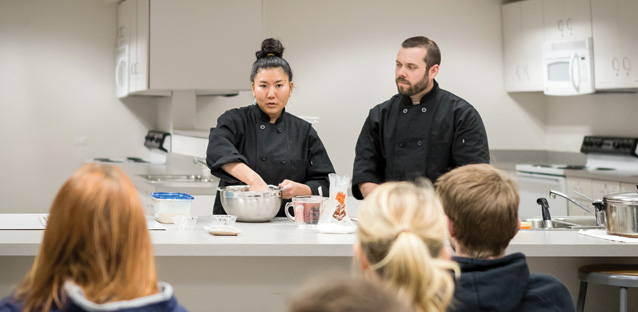Cooking Good Food for Class
Class: ENST 178 Food Preparation and Preservation
Taught by: Darci Hata, with assistant instructor Ian Mickells
Course Description: An introduction to basic culinary and food preservation techniques and management of garden vegetables
The goal of the class: Students learn to make connections, write clearly and do original research while learning about food.
Darci Hata ’10 feels fortunate to be teaching at her alma mater — and doubly so because she teaches a subject she’s passionate about, for a class students line up to take: Environmental Studies 178 teaches students how to cook and preserve food from farm to table.
Hata works alongside her husband, Ian Mickells ’09, who first proposed the class and is the assistant instructor. Together, they watch their students’ culinary expertise and comfort grow throughout the semester. “It’s nice to see the growth from the beginning with students, from day one making scrambled eggs, to actually putting in the effort like ‘I practiced my knife cuts,’ or ‘I cooked (chicken) to the right temperature,’” Hata says. “The fact that it’s all hands-on really helps them learn.”
Classes meet once per week on Monday evenings. Students work together to make about 10 dishes each class. They start with a 15- to 30-minute lecture, then have the next two hours to prepare all the food. “I always tell my students, ‘Bring your Tupperware; take it home.’”
Students form groups at the beginning of the semester that remains together through the final. This is to mimic a real-life restaurant scenario, working with a staff to produce good food. The final consists of the student teams designing, purchasing and preparing a three-course meal, judged by a panel of culinary critics, including Hata, Mickells and a selection of special guest judges.
Hata and Mickells have utilized different resources to develop the food prep curriculum for their students. Here’s a list of eight favorite food and life skill sources they’ve used, in order of their usefulness and impact:
- The Flavor Bible, Andrew Dornenburg and Karen Page, 2008
- Maangchi’s Real Korean Cooking, Maangchi, with Lauren Chattman, 2015
- Mastering Fermentation, Mary Karlin, 2013
- Salt Fat Acid Heat, Samin Nosrat, 2017
- “Salt Fat Acid Heat,” The Netflix Original series, Samin Nosrat, 2018
- The Art of Fermentation, Sandor Katz, 2012
- The Food Lab, J. Kenji Lopez-Alt, 2015
- The All New Ball Book of Canning and Preserving, Oxmoor House, 2016
“They’re graded on (planning), then the presentation of the menu, as well as the grocery list, and they have to stay within a $35 budget, that’s really important … Then we base it off of course flavor, the presentation, the organization of their stations, teamwork and creativity,” Hata explains. “(The budget) is part of their grade because if they go over, I won’t buy it for them. So then they have to be able to work on adjusting their recipes.”
Since this is the sixth time that Hata has taught this class, there are very few surprises. “We work in a classroom with these kitchen knives,” she says, “and I have a very long lecture where I tell everyone, ‘if you’re going to have an argument, put the knife down and go into the hallway.’”
Hata and Mickells are looking for ways to introduce a second section to help accommodate more students.
“I think I have more UNC Bear Pride now than I ever did as a student,” Hata says. “I’m really proud of the class that we’ve created, and that we have this opportunity.”
–Austin Huber


